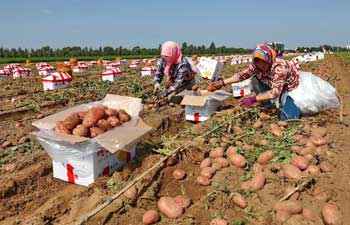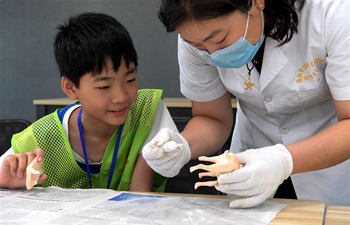HEFEI, Aug. 3 (Xinhua) -- Aynur Memet has never thought about realizing her and her mother's dream at a factory in east China's Anhui Province, which is about 3,500 km away from her hometown in northwest China's Xinjiang Uygur Autonomous Region.
"My mom has a dream to open a convenience store in my village. It's my dream to help fulfill her dream," said the 20-year-old from a village in Pishan County of Hotan Prefecture.
Aynur is also a third-year student at Pishan County Vocational and Technical School. With the help of the education bureau of the Hotan Prefecture, over 500 students from the prefecture joined an internship program in November 2017 to work as interns at the Highbroad Advanced Material Co., Ltd. in Hefei, capital of Anhui Province. Aynur is among them.
The students were both excited and worried when they first came to Hefei, the place where they would spend a year or two. For most of them, it was the first time for them to go so far away from home.
Highbroad is a company that produces display parts for electronic devices, therefore, it requires very high standards of working environment where everyone needs to wear dustless clothes from hair to toe before entering the workplace.
"The climate is very humid in Hefei compared with that in Xinjiang. It's not comfortable wearing the stuffy dustless clothes," said Aynur.
The Uygur girl would call her parents every time when she missed home. On one such call, she learned that her mother hoped to open a store in her village. "It was tough to work in the plant in the first few weeks. There were several times I wanted to give up, but I did not because I wanted to help my mom," she said.
Another problem Aynur faced like many other students from Xinjiang was the language barrier. To solve the problem, Aynur wrote down all the technical terms in her notebook and reviewed them after work. In addition, her colleagues were so patient that they would teach her the skills over and over again until she finally got it.
After several months of arduous efforts, she made huge progress in terms of both working skills and Mandarin proficiency. Aynur quickly stood out among her peers.
"She can now churn out 3,000 products each day, almost six times more than what she did at the beginning," her colleague Wang Yan said.
Impressed by Aynur's hard work and quick learning ability, the manager appointed her as the production line leader in March 2018, which was quite rare back then.
"My salary has increased from 3,000 to 4,500 yuan (650 U.S. dollars) per month, but that also comes with greater responsibility. I am now in charge of the whole production line of 38 employees, including 16 local people from Anhui," Aynur said.
Aynur had a holiday this March for the first time since she came to Hefei. She brought back all her savings of over 50,000 yuan.
"I took out about 25,000 yuan to help my mom open a convenience store of 30 square meters in the village. The rest of the money will be used to improve the family's living conditions and send my brothers to college," said Aynur.
Pairing assistance, a national strategy in China to channel financial and personnel support to less developed regions, has significantly boosted progress and social stability in Xinjiang and will continue to help the region achieve prosperity.
A total of 19 provinces and municipalities across China are engaged in pairing assistance for different parts of Xinjiang. Enterprises from Anhui Province have actively responded to the call by setting up factories at and accepting surplus labor from Hotan of Xinjiang, according to Han Dazhi, Party chief of Pishan County Vocational and Technical School.
After three weeks at home, Aynur returned to Hefei where she is going to spend the last few months of her internship. Born into a farming family in Xinjiang, the 20-year-old student still can not believe she has come so far.
"The store has been open for three months. It runs pretty well with an average daily turnover of 1,500 yuan," Aynur's mother Buwizure happily told her over the phone.

















